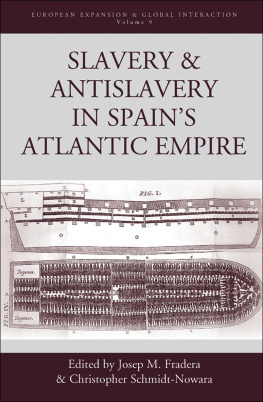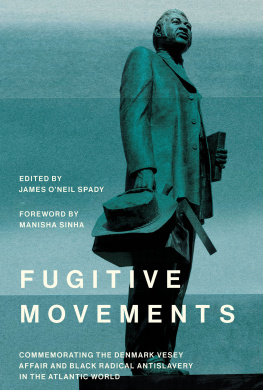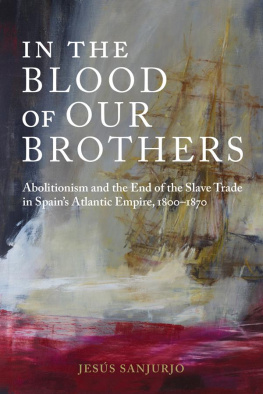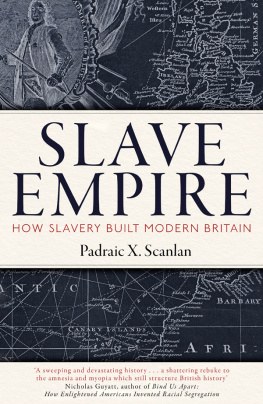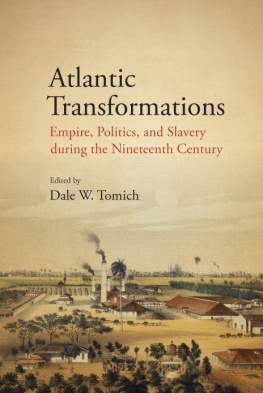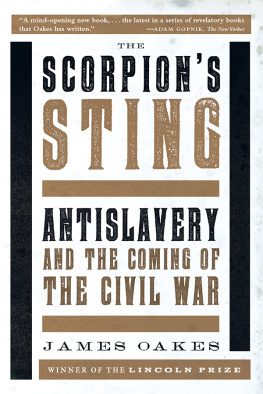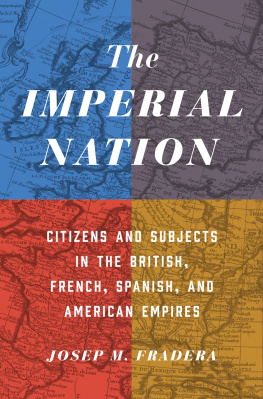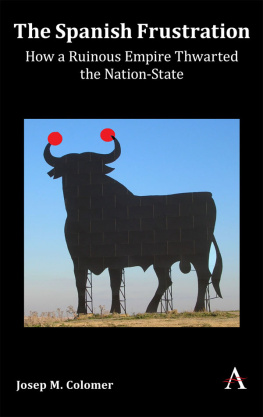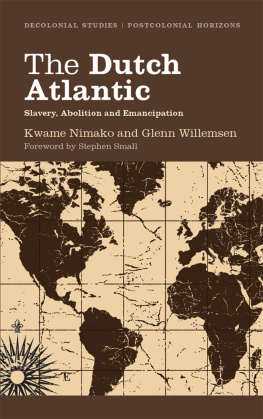S LAVERY AND A NTISLAVERY IN S PAINS A TLANTIC E MPIRE
E UROPEAN E XPANSION & G LOBAL I NTERACTION
General Editor: Seymour Drescher,University Professor, Department of History, University of Pittsburgh
Editor Emeritus: Pieter Emmer,Institute for the History of European Expansion, Leiden University
It may be said that the question of how the technology, languages, institutions, and even pastimes of Western Europe came to dominate global civilizationeven came to create that civilizationis the greatest historical question of modern times. Yet scholars have paid relatively little attention to this veritable monumental phenomenon. This new series is designed to offer a forum for debate and bring new research to light.
V OLUME 1
The Language Encounter in the Americas, 14921800
Edited by Edward G. Gray and Norman Fiering
V OLUME 2
The Jews and the Expansion of Europe to the West, 14001800
Edited by Paolo Bernardini and Norman Fiering
V OLUME 3
The Dutch-Munsee Encounter in America: The Struggle for Sovereignty in the Hudson Valley
Paul Otto
V OLUME 4
The Sounds of Silence: Nineteenth-Century Portugal and the Abolition of the Slave Trade
Joo Pedro Marques
V OLUME 5
The Dutch Slave Trade, 15001850
Pieter Emmer
V OLUME 6
Possessing the World: Taking the Measurements of Colonisation from the 18th to the 20th Century
Bouda Etemad
V OLUME 7
Pious Pursuits: German Moravians in the Atlantic World
Edited by Michelle Gillespie and Robert Beachy
V OLUME 8
Who Abolished Slavery? Slave Revolts and Abolitionism:
A Debate with Joo Pedro Marques
Edited by Seymour Drescher and Pieter Emmer
V OLUME 9
Slavery and Antislavery in Spains Atlantic Empire
Edited by Josep M. Fradera and Christopher Schmidt-Nowara
S LAVERY AND A NTISLAVERY IN S PAINS A TLANTIC E MPIRE
Edited by
Josep M. Fradera
and
Christopher Schmidt-Nowara
First published in 2013 by
Berghahn Books
www.berghahnbooks.com
2013, 2016 Josep M. Fradera and Christopher Schmidt-Nowara
First paperback edition published in 2016
All rights reserved. Except for the quotation of short passages for the purposes of criticism and review, no part of this book may be reproduced in any form or by any means, electronic or mechanical, including photocopying, recording, or any information storage and retrieval system now known or to be invented, without written permission of the publisher.
Library of Congress Cataloging-in-Publication Data
Slavery and antislavery in Spains Atlantic empire / edited by Josep M. Fradera and Christopher Schmidt-Nowara.
p. cm. (European expansion & global interaction; v. 9)
Includes bibliographical references and index.
ISBN 978-0-85745-933-6 (hardback) ISBN 978-1-78533-026-1 (paperback)
ISBN 978-0-85745-934-3 (ebook)
1. Slave tradeCaribbean AreaHistory. 2. Slave tradeLatin AmericaHistory. 3. SlaveryCaribbean AreaHistory. 4. SlaveryLatin AmericaHistory. 5. Antislavery movementsCaribbean AreaHistory. 6. Antislavery movementsLatin AmericaHistory. 7. SpainColoniesAmericaHistory. I. Fradera, Josep Maria. II. Schmidt-Nowara, Christopher, 1966
HT1052.5.S58 2013
306.36209729dc23
2012037871
British Library Cataloguing in Publication Data
A catalogue record for this book is available from the British Library
ISBN 978-0-85745-933-6 hardback
ISBN 978-1-78533-026-1 paperback
ISBN 978-0-85745-934-3 ebook
To Althea and Pere
In Memoriam Christopher Schmidt-Nowara
My colleague and friend Chris died unexpectedly in Paris on June 27, 2015. He had been the heart and soul behind the publication of this book, which now has reached its paperback edition. Having originated in a gathering of historians at Barcelonas Pompeu Fabra University, from the very beginning both he and the local hosts had thought of publishing the papers as a collective book. Our aim was to make available a broad-ranging and up-to-date history of slavery and emancipation in the Hispanic world, and we looked to colleagues from a wide range of backgrounds for help. That this task was a shared one would not anyone surprise anyone who knew Chris. His dedication and enthusiasm had long served as a bridge between Catalan, Spanish, and American historians interested in slavery, popular politics, and empires. That he is no longer with us is a loss we all feel, along with the warmth of remembrance. In the name of all the authors, I dedicate this second edition to the scholar who did the most to inspire this collective work.
Josep M. Fradera
C ONTENTS
Josep M. Fradera and Christopher Schmidt-Nowara
Josep M. Delgado Ribas
Luiz Felipe de Alencastro
Juan Carlos Garavaglia
Alejandro de la Fuente
Ada Ferrer
Christopher Schmidt-Nowara
Martn Rodrigo y Alharilla
Michael Zeuske and Orlando Garca Martnez
Albert Garcia Bala
Josep M. Fradera
Seymour Drescher
I LLUSTRATIONS
Figures
Tables
Graphs
Maps
A cknowledgments
O ur most grateful acknowledgments go to our friend and colleague Stephen Jacobson, who diligently laid the groundwork for our meeting at the Universitat Pompeu Fabra (Barcelona) in June 2009. He was ably assisted by Teresa Segura. Thanks also to Rebecca Scott and Jean Hbrard for their contributions to our conversations in Barcelona. The necessary financial support for our meeting, writing, and revising was provided by the Departament dHumanitats of the Universitat Pompeu Fabra, the Institut Universitari dHistoria Jaume Vicens Vives, Fordham Universitys Office of Research, the Prince of Asturias Chair in Spanish Culture & Civilization at Tufts University, and several grants from Spains Ministerio de Ciencia e Innovacin: HAR 2008-04960-E, HAR2009-07103, and Proyecto I+D+I HAR 2009-C02-C01. Thanks also to the three readers for the press who provided constructive feedback. Mary Ellen Kerans, Mary Savage, and Ailish Maher made the careful translations of the articles by Josep M. Delgado, Juan Carlos Garavaglia, Martn Rodrigo, Albert Garcia Bala, and Josep M. Fradera. Our thanks to them.
I NTRODUCTION
Colonial Pioneer and Plantation Latecomer
Josep M. Fradera and Christopher Schmidt-Nowara

T he history of slavery and antislavery in the Spanish Empire fits uneasily into the narrative of Atlantic history. Spain was the first Atlantic empire to establish sugar plantations in its American colonies, but it was also the last to engage directly in the transatlantic slave trade. Just as antislavery ideals seemed to gain the upper hand in the British and French Empires, pro-slave trade and pro-slavery policies were on the ascent in Spain and its colonies. As most of Spanish America achieved independence in the 1820s and the new republics abolished the slave trade to their shores and took gradual steps against slavery, too, Spain retained Cuba, the single largest plantation society in Spanish colonial history. This apparent discord with the Atlantic currents of slave trading, plantation slavery, and abolitionism has often made the Spanish Empire seem a case apart in the study of slavery and abolition. Our view, however, is that this apparently singular case is in reality part of the very historical trends it would seem to defy.




